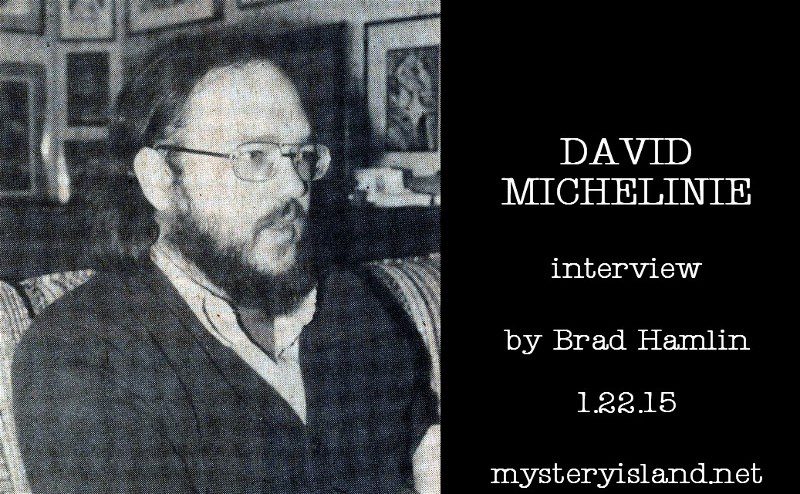
BRAD: David, welcome to Mystery Island!
When I was a wee lad in the mystical time of the 1970s, two events changed the way us kids viewed comic books: the murder of Spider-Man’s girlfriend (and role model for what I looked for in a future wife), and the murder of Aquaman’s baby son, Aquababy!
We’ll deal with Gerry Conway’s Spider-Man crime at a later date, but I’ve always wanted to ask you about Arthur, Jr. How did that event come about and why? Don’t spare the details!
DAVID: I’m afraid that, after almost 40 years, I don’t have many details to spare or share! I do remember that I took the Aquaman series over from Paul Levitz, and I’m pretty sure the Arthur, Jr. storyline was already in place then. I really didn’t have anything against Aquababy, so it’s most likely that I was just carrying through the plot threads that the previous writer left.
[EDITOR NOTE TO SELF: Call Paul. The aquatic investigation continues …]
BRAD: Also, you revealed during that run that Black Manta was actually black! Was that controversial at all at the time? Strangely, just the word black, these days, can become something of a politically correct booby trap.
Art by Jim Aparo (Adventure Comics No. 451, DC Comics 1977).
DAVID: I don’t remember any controversy at all. I also don’t remember making a conscious decision to have Black Manta be a black man. It may have well been my decision, or the editor’s, but then again I may have just assumed he was black because that’s what everyone called him!
BRAD: I was surprised after the high drama of those Adventure Comics with Aquaman and the short-lived return of Aquaman to his own series that the character still didn’t get a proper chance to develop on his own, consigned for many years as an ensemble member of the Justice League and/or Super Friends. In your opinion, what went wrong for the master of aquatic awesomeness?
DAVID: Actually, writing Aquaman made me aware of a lot of limitations that came with the character, at least at that time. His world was pretty much under the oceans, and writing those stories was almost like writing about an alien on another planet. You didn’t have the visual shortcuts or familiarities of a setting like New York or Los Angeles; it was difficult to have the character run into better known surface villains or heroes, and you weren’t able to use a lot of current or pop culture references (unlikely that Aquaman would stop by a Burger King or rush home to catch the latest episode of Game of Thrones). And if for whatever reason he found himself in a storyline on the surface, you pretty much had to contrive situations where his unique abilities (swimming stunts, talking to or directing fish) could be used. Plus, he had to breathe water every hour or so or he’d die. And it was kind of tough to do ongoing story arcs and generate a wide variety of conflicts within those restrictions. Maybe that’s one of the reasons he never really took off.
BRAD: If the opportunity presented itself to write a current Aquaman feature, would you be interested, and if so, what might happen 20,000 leagues under the sea?
DAVID: DC hasn’t offered me work in almost 20 years, so it’s unlikely that they would think of me when looking for an Aquaman story. If they did, I have no idea what I’d write. I’d probably have to read up on what the character was doing these days, then talk to the editor about what kind of direction DC wanted him to take, and then figure out if I thought I could do some entertaining stories that would fit DC’s requirements.
BRAD: With the popularity of the Iron Man films, I’m sure you get asked quite a bit about “Demon in a Bottle.” Again, you upped the ante on the drama for a major character. Was it your goal to cause as much chaos as possible?
DAVID: No, my goal was to create stories that grew organically from what the character was, to create conflicts that originated with his situation and personality. At the time, Tony Stark had broken up with his love interest. His “friends” at S.H.I.E.L.D. were trying to take over his company, and the government was attempting to regulate his life as a super hero. He needed a release valve from all that pressure, and since it had long been established that Tony was not opposed to tipping the bottle on occasion, that seemed like a natural way to go. I basically asked myself, “If Tony Stark was a real person in this situation, what would he do?”
BRAD: I created an alcoholic super crime fighter back in the 80s, and over the years I’ve had mixed feelings about the appropriateness of having young people read those stories. Was there ever any regret in turning Tony into a lush?
DAVID: Not a bit. Heroes become heroes by fighting villains, and what villain could be more insidious, more dangerous, and more difficult to defeat than one’s own weakness? And we all have a weakness, whether it’s drugs or cheeseburgers or sex or dice. What could be more universal than something every reader, no matter their age, could identify with on some level? Plus, show me a comics reader who hasn’t known someone, a relative or friend or neighbor, who has struggled with alcohol dependence. I know from talking with people at conventions that showing a hero, someone they look up to, fighting that battle and with courage and belief in themselves winning it, can actually help a young person understand and cope with such problems in the real world.
BRAD: Jon Favreau said he was asked repeatedly by fans about “Demon in a Bottle” and whether or not that plot-line would get directly adapted. What are your thoughts on that? Would it be interesting to see Robert Downey, Jr. tap into his own experience with addiction to bring that conflict alive with Iron Man on screen?
DAVID: I can’t imagine anyone doing a better Tony Stark than Robert Downey, Jr. If he wanted to tackle the “Demon” storyline, he’d do a great job of it, whether drawing from his own experience or just exercising his formidable acting chops.
BRAD: You’ve worked with essentially the big guns of the hero industry: Superman, Spider-Man, Wonder Woman, as well as another Mystery Island favorite, Ant-Man, but you’ve also added to the landscape by creating characters. What character did you create that you feel the closest bond with?
DAVID: Did I ever write Wonder Woman? I did a couple of pitches with Paul Ryan back in the 1990s, but nothing ever came of them. Have I forgotten something? Oh, well…if by “created” you mean built from scratch, not revamped or re-imagined or other such revisions, the choices are somewhat limited. I think it’s natural that I would have a special affection for Bozz, the naive alien stranded in Victorian England in THE BOZZ CHRONICLES. I think everyone has felt lost in a world where they didn’t belong at some time in their lives. And finding true friends that help you through, like Bozz did, is something most people long for. On a more mainstream level, I had strong feelings for Eddie Brock, a.k.a. Venom. He made one mistake, and it ruined his life. He then took a common reaction–looking for someone else to blame–to extremes, twisted things in his mind so that he was the victim and Spider-Man was the bad-guy, and a villain was born. He wasn’t really evil, he was just overwhelmed by circumstance and fought back with desperation. Of course, with Marvel going The Newer 52 route, who knows what the hell Venom is going to be tomorrow?
BRAD: We’ll check out Bozz! On Wonder Woman, it was actually the only time period I ever read a story arch of her comic. She had quit the Justice League and was attempting to rejoin, but first her worthiness had to be tested by each League member in a gimmick that ran the length of 1975 (same time you were writing Aquaman). The stories were written by Elliot S. Maggin, but I think he was ill or something and you filled in on issue 218, wherein WW is tested by not one member, but two: The Red Tornado and The Phantom Stranger! Hey, you asked …
Tell us this, what’s your favorite story you wrote, aside from the well-known pieces, the one that sort of got away, the one readers should look for?
DAVID: With more than 600 stories published over 40+ years there’s no way I can pick a single favorite. I’d have to go back and read them all to refresh my memory, and that in itself could take years! I will single out a particular series, though. Back around 1974 or so I was assigned my first regular comics series: “The Unknown Soldier” in DC’s STAR SPANGLED WAR STORIES. Absolutely nobody knew who I was back then, and most comics fans didn’t read war books. Nevertheless, it was a tremendous opportunity, and I learned a huge amount from the experience, in great part by working with one of the best editors in the business, Joe Orlando. Recently DC reprinted a lot of those stories in SHOWCASE PRESENTS THE UNKNOWN SOLDIER VOLUME 2. I sat down and read them for the first time since the ‘70s and my reaction was, “Really? I wrote that? Wow…” They were well structured, had a beginning, a middle and an end, and had a point. All in 11-13 pages. I don’t know if I could write like that these days.
BRAD: I’m actually about halfway through the first volume of Unknown Solider, and we’ll definitely pick up the next and look for those stories.
Please tell our readers why comic books are important:
DAVID: Because stories are important. They entertain, they inform, they nourish the imagination. And these days, though few people seem to notice, comic books provide more freedom than most other forms of popular entertainment because they don’t have as many restrictions as other media. Unlike movies or television, they don’t have to worry about budgets or casting or set building or location problems. A comics story can take place on Mars as easily as in Manhattan, in the wild west as easily as prehistoric times or the far future, and all for the same cost and effort. The only other medium with that much freedom is prose, but in comics you get both words AND pictures!
BRAD: Under the sea even!
And when David Michelinie is not writing comic books, what does he like to write?
DAVID: Professionally, I’ve written short stories, novels, non-fiction, and television animation. But when I write for myself it’s pretty much songs or the occasional poem. It’s just me and the words, and maybe a guitar, with no one to please but myself and no worries about whether the finished product will be accepted, will sell, will be anything but what I want it to be.
[EDITOR’S NOTE: You can read an epic Michelinie poem in the latest issue of Zero Percent Magazine! Just click the eyeball above! Art by MORT TODD!]
BRAD: I saw that Chuck Dixon did some Claw the Unconquered stories a few years back. Would you be interested in strapping on the sword and sorcery gig again? Feels like there’s some untapped potential at DC at the moment.
DAVID: Huh. I never knew of Mr. Dixon’s stories. I assume they were good. Were they for DC? (I seem to remember DC loaning the character to another publisher for a Red Sonja story some time back.) Did they credit me for creating the character? (Just threw that in for laughs.) Anyway, I’d have to answer with the same criteria I used answering the earlier Aquaman question: I’d need to see where the character was and what the publisher wanted me to do with it. In this case, I’d also have to decide whether the character was still the same as the one I created, and if any changes were ones I could live with.
BRAD: Yeah, wow, I can’t believe they don’t send creator copies of this stuff out. They ran it on the Wildstorm imprint.
Is there a particular genre that you feel most at home with?
DAVID: Oddly enough, while I seem to be most closely associated with super heroes, that’s the one genre where I rarely spend my free time. When I have a specific character to write I can concentrate on that, but people with super powers rarely enter my thoughts when I’m not writing their stories. I suppose horror/suspense, especially in unusual settings, is something I feel drawn to. That, and space opera.
BRAD: Cool, I like space opera. We saw your picture of you and the kittens. Is David Michelinie a cat person?
DAVID: I like animals in general, love dogs, but I adore cats. There’s something about their mere presence that makes me happy. I remember when I lived in New York, I could be walking down the sidewalk in a blue funk, look up and see a cat in the window of an apartment building, and my mood would lift. The cats I’ve been around have all been gentle, affectionate creatures with no desire to hurt anyone. And the fact that something like that can still exist in this unnecessarily brutal world gives me a smattering of hope.
BRAD: For sure. We have many of the little beasts on Mystery Island, but not all are as tame as the ones you mention. 🙂 What are you working on now? What should zillions of interweb readers buy/look forward to purchasing?
DAVID: Lemme see, I’ve written three short comics pieces for Charlton Neo, a 2-parter which I’m told should see print in CHARLTON ACTION #1 & 2, and another that isn’t specifically set as of yet. And I have two prose stories that should see publication this year, one in a steampunk super hero anthology (yes, I said “steampunk super hero”) called SINGULARITY: RISE OF THE POST HUMANS, and one in an homage to 1960s comics called (if I remember correctly), GIANT SWINGIN’ SUPERHERO 1968 SPECIAL. And lastly, the six BOZZ CHRONICLE stories I created for Marvel’s Epic line back in the mid-’80s are being collected in a trade paperback from Dover Publications, with new art by Bret Blevins, due out in August. Other than a bunch of reprint collections from Marvel, thazzit!
BRAD: Hear that, people? Lots o’ fun stuff to read. Get off the computer and feed your head.
Thanks, David!
“David Michelinie Interview”
by Bradley Mason Hamlin. Edited by Lucy Hell.
© 2015 by Mystery Island Publications. Published: 01.22.15.
All rights reserved.


